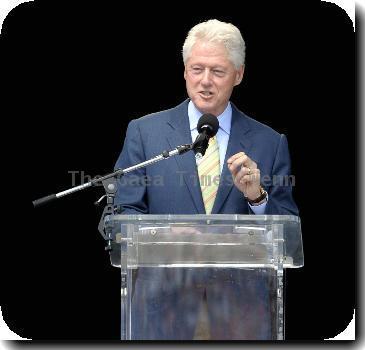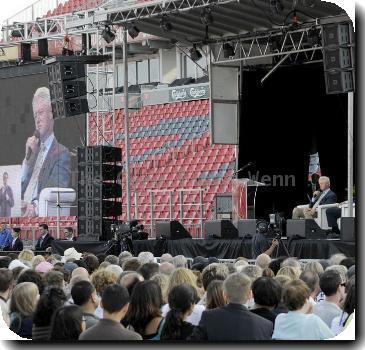Palestinians want UN to endorse state; Israel threatens its own unilateral steps in response
By Mark Lavie, APSunday, November 15, 2009
Frustrated Palestinians to appeal to UN for state
JERUSALEM — A Palestinian drive to ask the U.N. Security Council to endorse a state unilaterally, put forward by a top negotiator Sunday, appeared more an expression of frustration with U.S. and Israeli policies and stalled peace talks than a real effort to go it alone.
A resolution for a Palestinian state could face a veto from the U.S., Israel’s main ally. But if the Security Council approved it, consequences could be even more severe.
Israeli Prime Minister Benjamin Netanyahu rejected the move, warning Israel would retaliate.
“There is no substitute for negotiations between Israel and the Palestinians,” Netanyahu said in a speech at the Saban Forum in Jerusalem Sunday evening, saying he wanted a full peace agreement with them.
Then he warned, “Any unilateral action would only unravel the framework of agreements between us and can only lead to one-sided steps on the part of Israel.”
He did not elaborate further, but an Israeli legal expert said if the Palestinians move ahead by themselves, Israel would be within its rights to cancel interim peace accords, which regulate daily life between the two sides.
The Palestinians are upset over continued expansion of Israeli settlements in the West Bank and east Jerusalem and are disappointed with the U.S. failure to put pressure on Israel to halt the construction. The lack of progress led Palestinian President Mahmoud Abbas to threaten to quit politics earlier this month.
As events unfolded, that, too, appeared to be an indirect appeal for international backing by Abbas, who enjoys considerable world support.
Abbas said he did note want to run in an election set in January. But last week, election officials postponed the vote indefinitely, saying that the militant Islamic Hamas’ control of the Gaza Strip made it impossible to proceed. In the West Bank Sunday, officials in Abbas’ Fatah Party said they would meet next month to extend his term indefinitely.
Chief Palestinian negotiator Saeb Erekat said frustrated Palestinians had decided to turn to the U.N. Security Council after 18 years of on-again, off-again negotiations with Israel.
“Now is our defining moment. We went into this peace process in order to achieve a two-state solution,” he said. “The endgame is to tell the Israelis that now the international community has recognized the two-state solution on the ‘67 borders,” referring to the cease-fire lines in effect before the 1967 war, when Israel captured territories from Jordan and Egypt that the Palestinians claim for their state.
Further complicating the situation is the status of the Gaza Strip. Erekat said the U.N. initiative would be to create a state in the West Bank, Gaza Strip and east Jerusalem, but Hamas has controlled Gaza since it expelled forces loyal to the Western-backed Abbas in 2007.
Erekat declined to say when the Palestinians would make their appeal to the U.N, signaling that the threat may be aimed in large part at putting pressure on Israel.
Nimr Hamad, an adviser to Abbas, said the Palestinians “have no intention of rushing” to the Security Council.
The Palestinians declared independence on Nov. 15, 1988, in the midst of a violent uprising against Israel that lasted until the first interim accord was signed in 1993. Many countries recognized the declaration, but it was never implemented.
Instead, the interim accords set up a system of interlocking administrations that falls far short of peaceful relations but quietly brings some order to issues like Palestinian imports and exports, tax collection, utilities and security cooperation.
More importantly, Abbas’ Palestinian Authority itself is a product of the interim accords. If it were superseded by a U.N.-endorsed state, Israel could cut off relations with the Palestinian government.
In fact, Robbie Sabel, a former legal adviser to Israel’s Foreign Ministry and now a lecturer in international law at the Hebrew University of Jerusalem, told The Associated Press that Israel would be within its legal rights to cancel all the partial peace accords.
“Israel could say there has been such a gross and major violation that the agreement itself is no longer in force,” he said, since the agreement stipulates that all outstanding issues must be settled in negotiations.
Israel controls much of the West Bank, which is dotted by more than 100 settlements and army bases, with hundreds of roadblocks in place. A newly independent Palestinian state would be hard pressed to take control of its territory.
Some 300,000 settlers live in the West Bank, in addition to 180,000 Israelis living in Jewish neighborhoods built in east Jerusalem. Efforts to confront the Israelis could quickly escalate into widespread violence.
Hamad said Abbas would travel to Cairo Wednesday to discuss the plan to go to the U.N. with Egyptian President Hosni Mubarak.
There was no immediate reaction from Security Council members. But Erekat said Russia, another permanent member of the Security Council, and unspecified European nations are “on board” with the Palestinian plan.
Speaking at a conference in Jerusalem Sunday, ex-President Bill Clinton said the Israelis and Palestinians must hammer out an agreement.
“It’s a little piece of land; you can’t get away from each other,” he said, noting that the Palestinians have shown themselves capable of self-rule.
“They are proving in the West Bank that they can get this show on the road,” Clinton said.
Associated Press writers Steven Gutkin and Aron Heller contributed to this report.
Tags: Africa, Bill clinton, Egypt, Gaza Strip, International Agreements, Israel, Jerusalem, Middle East, North Africa, North America, Palestinian Territories, Territorial Disputes, United States, West Bank

